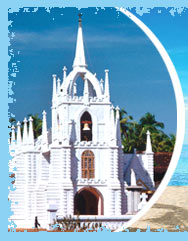 The
Safa masjid is a prominent Islamic shrine in Ponda, commonly regarded
the citadel of Hindu pilgrimages in Goa. Built in 1560 by Ibrahim Adil
Shah, the Sultan of Bijapur, the Safa mosque survived the havoc wreaked
by the Portuguese colonizers as part of the Inquisition process. During
the reign of the Bijapur Sultan, the region witnessed a proliferation of
mosques and Ponda alone was home to 27 of them.
The
Safa masjid is a prominent Islamic shrine in Ponda, commonly regarded
the citadel of Hindu pilgrimages in Goa. Built in 1560 by Ibrahim Adil
Shah, the Sultan of Bijapur, the Safa mosque survived the havoc wreaked
by the Portuguese colonizers as part of the Inquisition process. During
the reign of the Bijapur Sultan, the region witnessed a proliferation of
mosques and Ponda alone was home to 27 of them.Also known as the Shahouri masjid, the Safa masjid presents an elegant spectacle with typical Islamic arches decorating the walls. The mosque was located at the center of a sprawling complex of gardens and fountains remnants of which can be witnessed today. The rectangular prayer hall of the mosque rests above a high base and is capped with a pointed terracotta tile roof.
The massive water tank within the mosque premises is another attraction. Featuring small chambers decorated with 'meharab' designs, the tank is located to the south of the prayer hall unlike most mosques where it is located outside the main entrance. This mosque is a venue of celebration during festivals of Id-Ul-Fitr and Id-Ul-Zuha, by the local Muslim community.
How to Reach Safa Masjid
The Safa Masjid is situated 2 km west of the centre of Ponda town. There are rickshaws available at the main Ponda bus stand which can take you to the site of the Safa Masjid.











